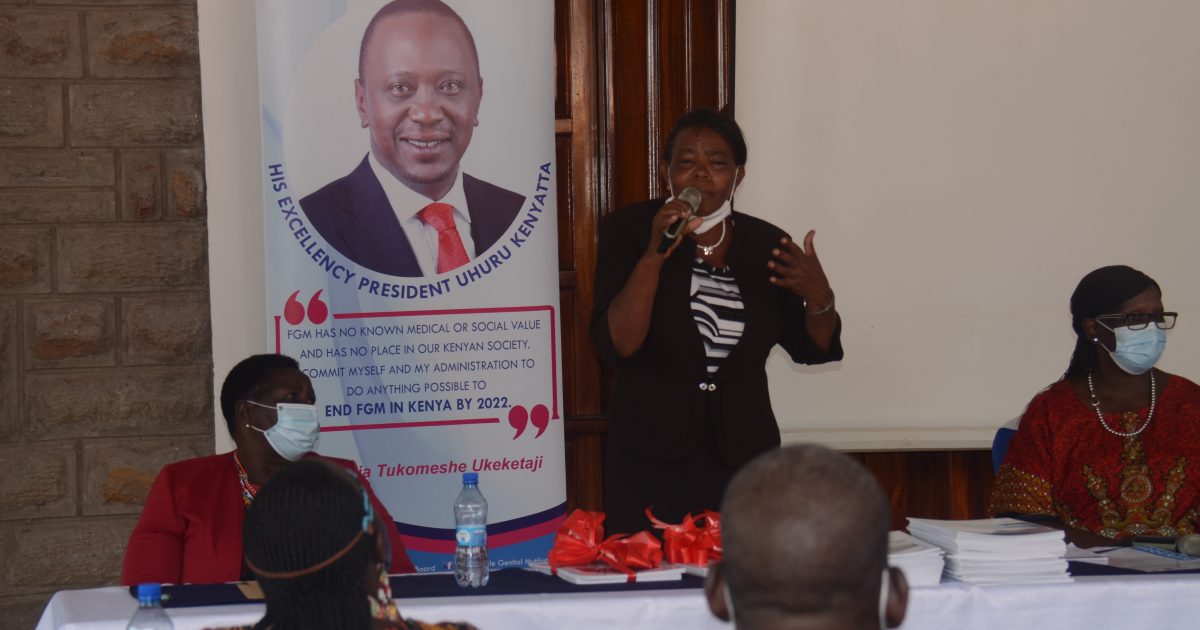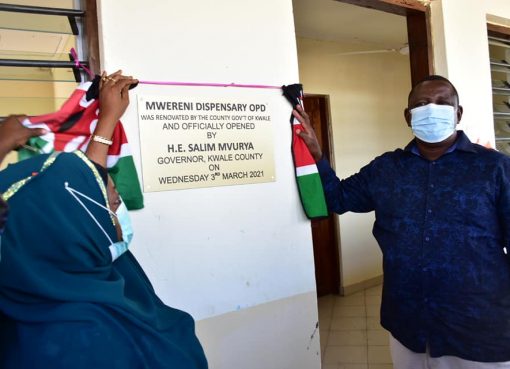Ms Robi Marwa, a resident of Kuria in Migori County dons an interesting curriculum Vitae (CV) and actually boasts as the first Kuria woman to escape the wrath of Female Genital Mutilation (FGM) in 1974.
A retired high school teacher and currently a leading anti FGM crusader among the Kuria community and Kenya as a whole, Ms Robi now holds an excellent score card in life as role model to young girls in Migori and beyond even as the FGM vice continues to rock the region unabated.
In a first interview with her on the sidelines of a recent launch in Migori County of two Policy Papers fomulated to comprehensively fight FGM in the area, Ms Robi applauded her father for standing by her side to oppose efforts to wheel her into the operation room to face the “Ngariba’s knife.”.
“He allowed me to make my own decision on the much loved Kuria community traditional rite that denied young girls’ a chance to a better education and healthcare,” she said of her father who stood firm against the traditional Kuria elders who wanted all girls to go through the initiation or face a curse.
She says that although she was young by then, her father who was a senior pastor at the time, refused any of her daughters to undergo the cut.
“My father had memorised the bible very well and said there was nowhere in the entire bible that talked about women circumcision,”said Robi.

Ms Robi said that her father would always preach against female circumcision to his congregation and he kept stressing the negative side of the rite to also Kuria elders, earning him a bad man and a traitor brand among the members of the community.
“According to the book of Genesis 17:13, God told Abraham to circumcise himself, cut his men house hold and his men slaves as an everlasting covenant. But nowhere at all in the Bible’s verses has he mentioned women circumcision,” Robi pointed out.
She says that when the time came for her to undergo the cut, her father refused. What followed was a total exclusion and a threat of excommunication against the whole family perpetrated by the community.
Their neighbours and close relatives ganged up with self–declared protectors of Kuria community tradition to burn their house down because his father had denounced a tradition that had existed way back.
“My father had to fast organise for her own safety and for the sake of her education by making her flee the village to another location within Migori, allowing her to continue with her education away from the cruel eyes of the community members.
Ms Robi says that she was able to study all the way to the university and eventually became a respected high school teacher.
“There is this myth that is believed until now that when you are not circumcised you are cursed and will never give birth. About me, they first said I would not get married. I got married. Then they said I would not be able to bear children. I have four, all learned,” said Robi, with a face expressing pride.
Due to her own life experience, she now encourages Kuria women to denounce the practice, saying that she is the best living example that they can emulate.
Ms Robi emphasises that Kuria girls should use the avenues that are now existing to help themselves better their education instead of accepting to undergo the cut.
Currently, the National Government, County Government and NGOs are spearheading the fight against the vice and all girls must know that they are well protected from the retrogressive culture and tradition that has been condemned world –over as a practice that is affecting the health, economic and social life of the girl-child.
“During my time there was no organisation that used to fight for our interests as FGM ravaged young girls. I was lucky because my father and God stood with me,” she said.
Today, partners of Anti FGM campaigns like the Adventist Development and Relief Agency (ADARA) and United Nations Children’s Fund (Unicef), have set up safe houses to accommodate young girls who escape the cut.
The National Government Administration and security agencies are now in full action, working hand to hand with the other well-wishers in the community to see that the vice is fought from all ends to bring it to a total halt.
As a result of this multi-pronged approach, a number of Chiefs and Assistant Chiefs who seem not to ascribe to the war, have lost their jobs simply because they have been found culpable in encouraging the vice.
Ms Robi today stands tall among the Kuria women and is proud that President Uhuru Kenyatta’s government is now committed and fully involved in ensuring that the vice ends by 2022.
“We have scholarships to help our daughters better their education and I want to encourage every Kuria girl to use the opportunity to help themselves in future,” said Ms Robi.
She says she started a primary academic school to help the vulnerable Kuria girls get better education and that during the 2020 KCPE, her first candidates scored 406 marks.
The Anti FGM crusader explains of how the Kuria girls are now lucky to have a free hotline number (1195) to call in case they want to report the about being coerced into the outlawed practice.
The same line can be used by other Kuria residents to report any perpetrators of the vice in the region.
However, Ms Robi is worried at the Migori County’s FGM prevalence rate that stands at 78 percent and pleads with the government to move with speed to launch and enforce the Kuria Declaration that works towards ending the vice completely.
“We have the Declarations from Samburus, Pokots and Borans that are doing great work towards stoping the vice completely,” said Ms. Robi.
By Geoffrey Makokha and George Agimba





